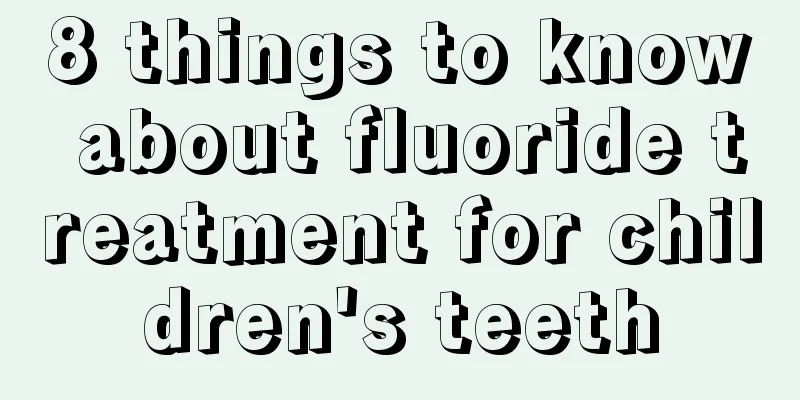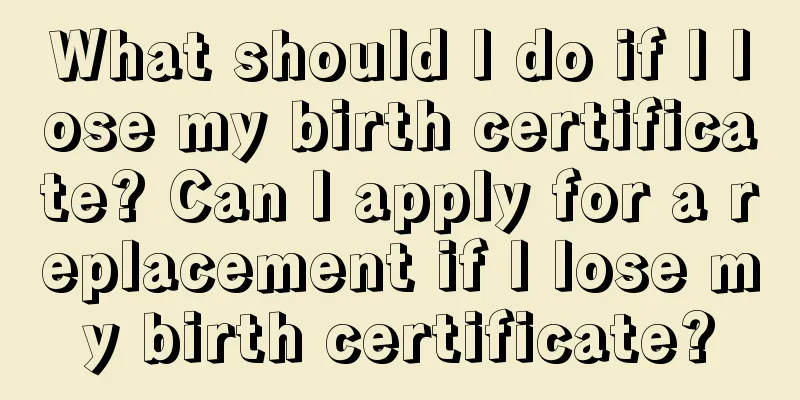8 things to know about fluoride treatment for children's teeth

|
When the baby starts to grow teeth, parents must pay attention to the baby's dental health and apply 1000ppm fluoride toothpaste to the baby from the beginning. Apply fluoride regularly after the age of three. This will effectively ensure the healthy growth of the baby's teeth. However, when applying fluoride to the baby, you also need to pay attention to the precautions afterwards. A baby started growing teeth at 6 months old, and had about 4 teeth when he was 1 year old, but all of them were decayed! Cai Zongping, president of the International Society of Pediatric Dentistry, said that babies under one year old often drink milk in the middle of the night, which increases the risk of tooth decay. Once the deciduous teeth are decayed and turn yellow, the bacteria may invade downwards and affect the permanent teeth that are still in the bone. "Without a good foundation, the condition of the grown teeth will certainly be poor." Many parents understand the importance of baby teeth and often clean their baby's teeth with water or gauze, or brush their baby's teeth with children's toothpaste containing fruit flavors. However, from the perspective of experts, these are of limited help to the oral health of young children. Cai Zongping pointed out that they often admit babies under one year old with tooth decay. Their teeth have just emerged and they already have tooth decay. Some one-year-old children have all four teeth decayed. Therefore, it is necessary for young children to use fluoride toothpaste early. At what age can you start seeing a dentist?Whether it is children or adults, regular oral examinations can help detect problems early. The generally recommended examination schedule is as follows: 1. For infants and young children aged 1 month to 6 years, the interval is about 2 to 3 months. 2. For school-age children aged 6 to 12 years, the interval is 3 to 6 months. 3. Once every 6 months for adults. Attention! Please see a dentist for a checkup after the first baby tooth grows out. Follow the dentist's advice to clean your child's teeth and check again every 2-3 months. Regular checkups for children include: "local fluoride application" and "sulcus fillings". Why do children need fluoride?Fluoride can effectively prevent tooth decay. Fluoride is very important for the calcification process of hard tissues (bones and teeth), especially the nearly complete crystal structure. Fluoride can be taken orally or applied topically to prevent tooth decay. It is currently one of the most recognized tools for preventing tooth decay. Newly erupted teeth are most susceptible to tooth decay. Therefore, before the age of thirteen, during the period of tooth development, appropriate topical fluoride application can increase the resistance of teeth to tooth decay. After the age of three, the dentist should apply topical fluoride every three to six months depending on the age and the severity of tooth decay. Precautions for children to apply fluorideFluoride coating can generally be divided into two types: coating with fluoride-containing agents; coating fluoride glue on dental trays. Cavities should be filled before applying fluoride. Cleans dental plaque and tartar. The tooth surface should be kept dry. Apply fluoride with a toothbrush or dental tray for 3 to 5 minutes Avoid eating, drinking or rinsing your mouth for 30 minutes after application to promote the absorption of fluoride on the tooth surface. 6. Don't worry if swallowed in small amounts. 7. You can buy fluoride toothpaste or mouthwash at home. 8. The Taiwan Department of Health subsidizes fluoride application for children under five years old once every six months. Children only need to pay the registration fee when they get checked in Taiwan. Children's dental care: Chang Chin-shun, chairman of the Dental Society, once said in an interview that good dental cleaning habits, fluoride application, and fissure filling can almost completely prevent tooth decay. Fissure filling is paid for by the patient, ranging from NT$500 to NT$1,500 per tooth (the cost varies by region and clinic). Occasionally, there will be free activities at charity clinics, but there are restrictions on the subjects (such as physically and mentally disabled students), age, and number of teeth. Five questions about baby teeth1. It doesn’t matter if your baby teeth are decayed, you will get new teeth anyway. Even though children will have replaced teeth, their baby teeth will accompany them for up to twelve years, and healthy baby teeth are the basis for healthy permanent teeth. Parents should take care of their baby teeth with the same attitude as they take care of their permanent teeth. 2. The child is too young and always cries when he goes to the dentist. Wait until he is older. The key to getting children to want to see the dentist is to start as early as possible, especially when the child already has tooth decay. 3. Sleeping on your stomach will affect the neat arrangement of teeth. Chen Liping, chief pediatric dentist at Taipei Chang Gung Hospital, once said in an interview that sleeping on your stomach will indeed make the shape of the dental arch more pointed, but it will not affect the development and arrangement of the teeth. 4. Children do not like to eat food that requires a long time to chew, which hinders the development of teeth. Most dentists will advise children to chew more to improve oral health. However, Dr. Chen Liping pointed out that the assumption that not liking to eat food that requires a long time to chew will shrink the gums and cause irregular teeth is unfounded and difficult to prove. 5. Taking calcium powder or calcium tablets will help your teeth grow better. Dr. Lin Fengpi of Yuanxiang Dental Clinic mentioned in the book "101 Keys to Beautiful and Good Teeth" that the period from three months old to eight years old is the time for tooth calcification, which is also the golden period for calcium supplementation. After calcification is completed, no matter how much calcium is supplemented, the teeth will not be able to absorb it. |
<<: What are the ways to protect children's eyes? Tips for protecting children's eyes
>>: Are antipyretics harmful to the kidneys? Side effects of antipyretics on children
Recommend
At what age can a baby walk? Don't hold the baby's hand when walking
Your baby may take his first step after 9 months,...
What should be paid attention to after the baby is scalded? How to repair the baby's scald scar
In daily life, babies may be scalded by boiling w...
How long is the best time to breastfeed your baby?
Generally, newborns are breastfed after birth, an...
Who can't eat bacon? Who can't eat bacon?
Although bacon is delicious, it is not suitable f...
Does goat milk powder supplement calcium? Which one is better for calcium, goat milk or cow milk?
Goat milk powder is a very common type of milk po...
Is the Thai TwinLotus Chinese Herbal Toothpaste good to use? Review
Toothpaste is a necessity in our daily life. We a...
Is it a big deal if the baby's umbilical cord falls off? What should I do if the baby's umbilical cord falls off and bleeds?
The umbilical cord care of newborns is very impor...
Can black toothpaste be used to wash your face? Can black toothpaste be used to wash your face every day?
Black toothpaste contains whitening ingredients, ...
How to stop feeding the baby at night without pain? How to stop feeding the baby at night?
How to stop feeding your baby at night without pa...
How to understand children's personality from their blood type and teach them in accordance with their aptitude
Every child has his or her own unique personality...
Does toothpaste have the effect of reducing inflammation and swelling? What does the color bar at the end of the toothpaste represent?
I don't know why my gums have been swollen re...
What causes the baby's XO leg shape abnormality?
Why do children's legs have different shapes?...
Does soaking your feet in mugwort help you get pregnant? Does soaking your feet in mugwort help you prepare for pregnancy?
Many women, when they reach a certain age, will s...
How to take probiotics for babies? How to take probiotics for babies
Probiotics can regulate the stomach and intestine...
Does Libai dishwashing liquid remove oil? How does Libai dishwashing liquid remove oil?
The most important thing about a dishwashing liqu...









